
Time to Speak Russian__Grammar Notes
.pdf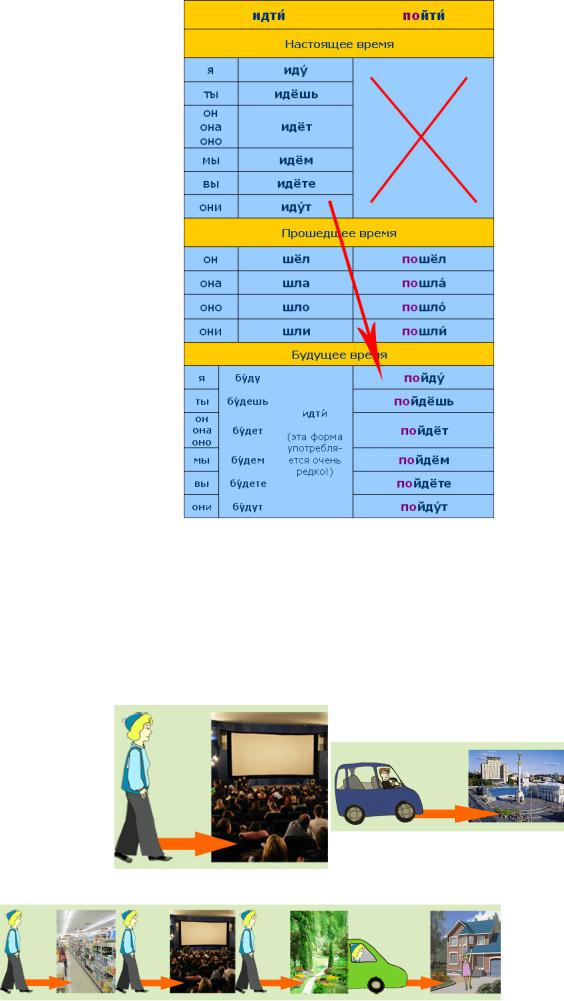
20.06.2015 |
Time to Speak Russian::Grammar Notes |
Verbs with the prefix "ПО" are used in the following cases:
1.To express a wish, intention or ability to go somewhere, we use the construction: хоте́ть, мочь + пойти / поехать:
Яхочу́пойти́в кино́.
Ямогу́пое́хать в Петербу́рг че́рез неде́лю.
Вы хоти́те пойти́на конце́рт за́втра?
Ты мо́жешь пое́хать на метро́?
2. The prefix "ПО" indicates the beginning of a motion, therefore "пойти / поехать" are used to indicate the beginning of a motion
Она пошла в кино. |
Он поехал в Киев. |
|
́ |
́ |
́ |
To describe a succession of movements, we also use verbs with the "ПО" prefix to indicate a beginning of each successive motion.
Вчера́я снача́ла пошла́в магази́н, пото́м пошла́в кино́, пото́м пошла́в парк, пото́м пое́хала к подру́ге.
http://www.speakrussian.cie.ru/time_new/eng/grammar/ |
51/59 |
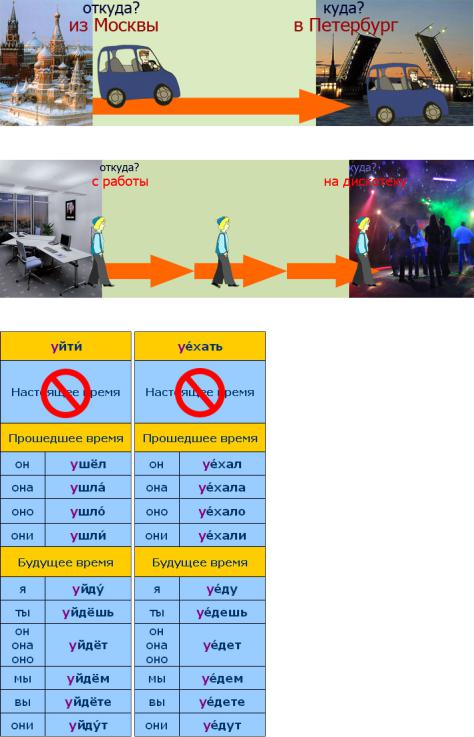
20.06.2015 |
Time to Speak Russian::Grammar Notes |
–Каки́е у тебя́пла́ны на за́втра?
–У́тром в пое́ду на ры́нок, пото́м пое́ду в магази́н, пото́м пойду́в бассе́йн, а ве́чером пойду́с дру́гом в рестора́н.
Please, note! To denote one and the same event that took place before, is taking place now or will take place in the future, in the Rus different verbs of motion are used:
Вчера́А́нна ходи́ла в кино́. = А́нна была́в кино́.
А́нна идёт в кино́сейча́с. = А́нна сейча́с на пути́в кино́.
А́нна пойдёт в кино́за́втра.
УЙТИ, УЕХАТЬ
To indicate the point of departure, we use verbs with the prefix "У" (уйти́or уе́хать), and a noun in the Genetive case with preposit to indicate the place of departure itself.
Андрей уе́хал из Москвы. = Андрей не в Москве.
Attention! Regardless of the stage of motion and the verb we use to describe it, the departure point is always indicate by the preposit case (2), while the destination (or objective) is denoted by the prepositions "В/НА" + Accusative case (4).
Андре́й уе́хал / пое́хал / е́дет / прие́хал из Москвы в Петербург.
О́льга ушла́/ пошла́/ идёт / пришла́с рабо́ты на дискоте́ку.
Take a look at how the verbs "уйти́" and "уе́хать" conjugate:
http://www.speakrussian.cie.ru/time_new/eng/grammar/ |
52/59 |
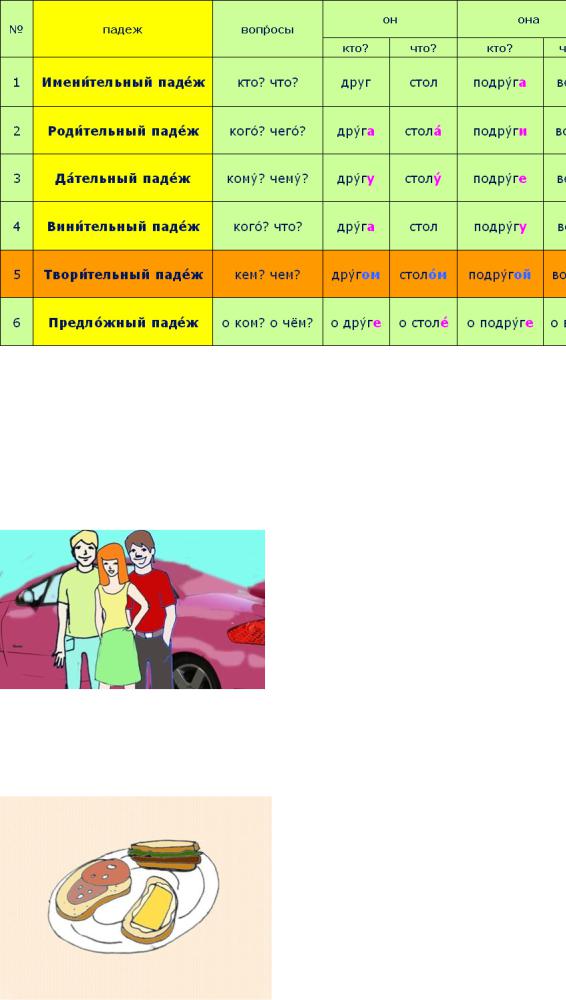
20.06.2015 |
Time to Speak Russian::Grammar Notes |
|
Instrumental Case |
Instrumental case and its meanings
1.Joint action
We use the Instrumental case with the preposition "с" to speak about people who perform an action jointy.
For example:
–Тимур, с кем ты вчера играл в футбол?
–Я играл с Иваном, с Андреем, с Сергеем, с Виктором.
–С кем Маша ходила в кино?
–Маша ходила в кино с подругой Леной.
Анна с Антоном и Петей завтра поедут в Петербург. = Анна, Антон и Петя поедут в Петербург.
2. Description
Often we use the Instrumental case with the preposition "C" to describe an object accurately.
For example:
Вот бутерброд с сыром, а вот бутерброд с колбасой. (Какой бутерброд? С чем бутерброд?)
http://www.speakrussian.cie.ru/time_new/eng/grammar/ |
53/59 |
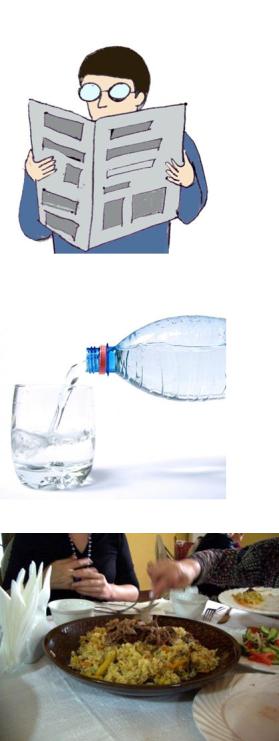
20.06.2015 |
Time to Speak Russian::Grammar Notes |
Вот человек с газетой. (Какой человек?)
Какую воду вы будете пить?
Я буду пить воду с газом.
А вот и плов с мясом!
Instrumental case forms
Personal pronouns in Instrumental case:
http://www.speakrussian.cie.ru/time_new/eng/grammar/ |
54/59 |
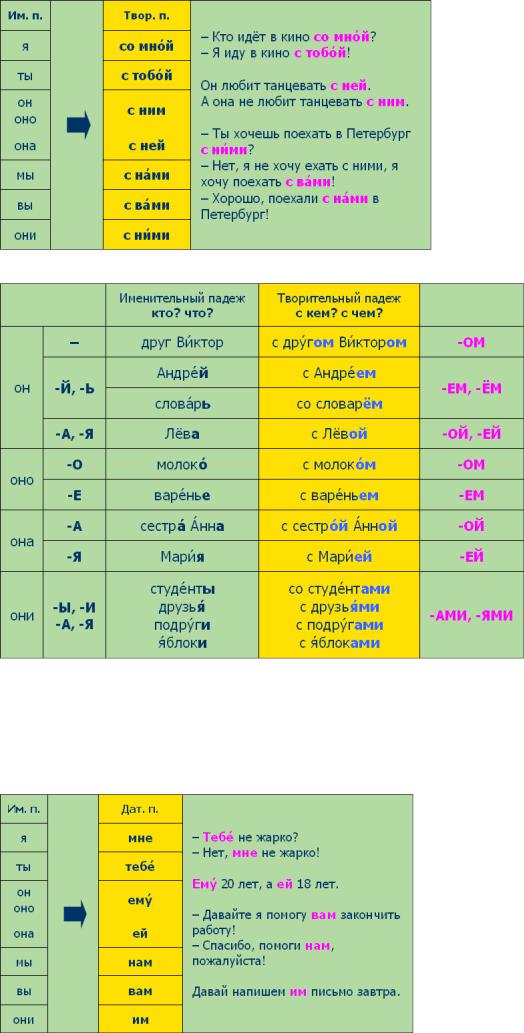
20.06.2015 |
Time to Speak Russian::Grammar Notes |
Nouns in Instrumental case:
How to denote age
Age is expressed by a construction where the noun in the Dative case indicates a person whose age we are talking about.
Это Иван. Ивану сейчас 16 лет.
Это Ирина. Ей сейчас 10 лет.
Сколько лет Марине Николаевне? Марине Николаевне 48 лет.
http://www.speakrussian.cie.ru/time_new/eng/grammar/ |
55/59 |
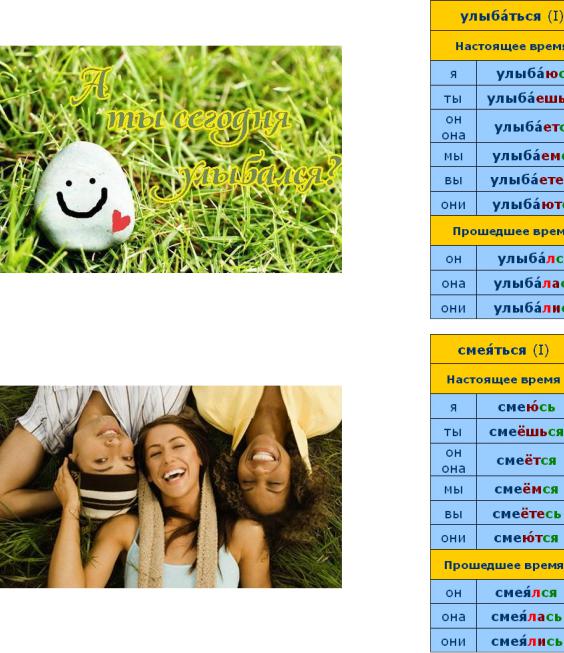
20.06.2015 |
Time to Speak Russian::Grammar Notes |
|
Reflexive verbs (continued) |
In the Russian language, there are several groups of reflexive verbs. Verbs in the first group describe actions performed by the agent agent ("одева́ться" = "dress oneself", "умыва́ться" = "wash one’s own face"). Verbs in the second group describe reciprocal actions more people towards one another (здоро́ваться = greet each, обнима́ться = hug each another). Verbs in the third group describe acti reflexive nor reciprocal. These verbs are simply never used without "ся", and they have to be memorized. Here they are:
http://www.speakrussian.cie.ru/time_new/eng/grammar/ |
56/59 |
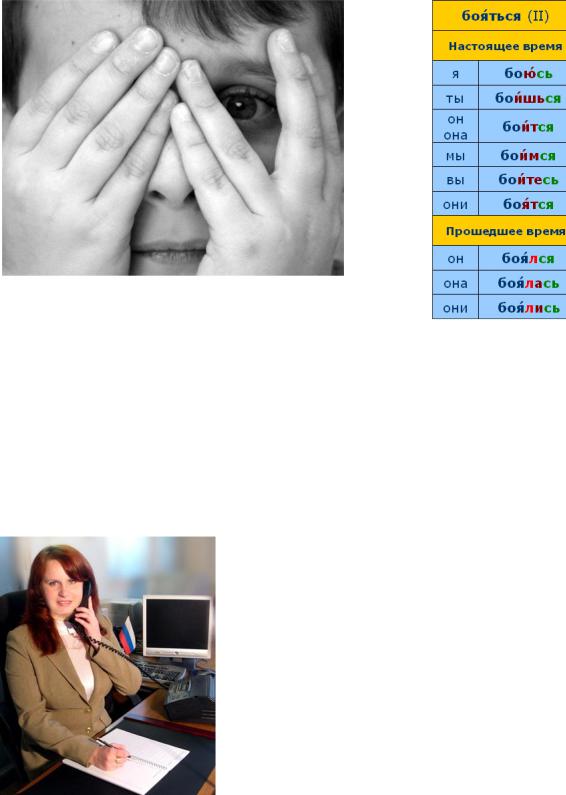
20.06.2015 |
Time to Speak Russian::Grammar Notes |
Instrumental Case
The Meanings of the Instrumental Case (continued)
3. Using nouns in the Instrumental case to describe occupation or profession
When we need to describe a person's occupation, we can do so, using nouns only :
Виктор инженер. Мария журналистка.
However, if we want to provide a more detailed information, we will rely on a verb. When an occupation is discussed, the verbs "ра "быть" (be) and "стать" (become) are most commonly used. These verbs are followed by a noun in the Instrumental case.
Инна работает менеджером.
Please, note!
The verb "БЫТЬ": do you remember that in Russian this verb is never used in the present tense?
Катя не хочет быть врачом, она хочет быть журналисткой.
Иван был студентом, а сейчас он банкир, работает в банке.
http://www.speakrussian.cie.ru/time_new/eng/grammar/ |
57/59 |

20.06.2015 |
Time to Speak Russian::Grammar Notes |
Николай сейчас еще студент, но после института он будет инженером.
СТАТЬ
Они стали политиками. Татьяна стала музыкантом. Сергей станет бизнесменом. Мы станем друзьями.
Instrumental Case
The Meanings of the Instrumental Case (continued)
4. Instrumental case: denoting an object
To describe a person's interests or hobbies, we can use reflexive verbs "занима́ться", "интересова́ться", "увлека́ться". The no verb and indicates an object of a hobby or interests always appears in the Instrumental case and doesn't require the preposition "c.".
ЗАНИМАТЬСЯ (чем?) спортом, иностранным языком, наукой, бизнесом…
Я люблю зимой заниматься спортом.
ИНТЕРЕСОВАТЬСЯ (чем?) искусством, музыкой, театром…
Марина музыкант. Она всегда интересовалась музыкой.
Иван бизнесмен. Он занимается бизнесом всегда.
http://www.speakrussian.cie.ru/time_new/eng/grammar/ |
58/59 |
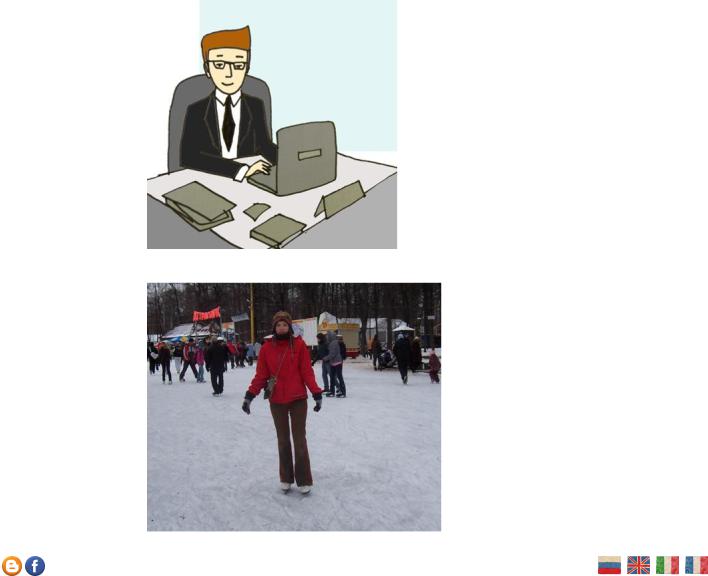
20.06.2015 |
Time to Speak Russian::Grammar Notes |
Когда у неё есть свободное время, она катается на коньках.
© 20072012 Center For International Education
http://www.speakrussian.cie.ru/time_new/eng/grammar/ |
59/59 |
